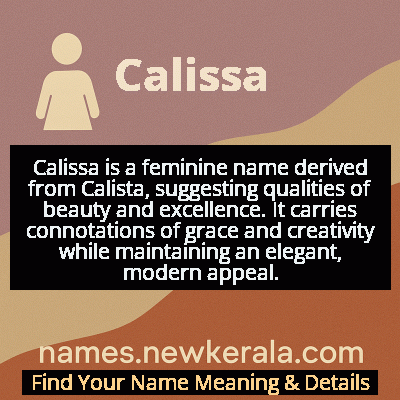Calissa Name Meaning & Details
Origin, Popularity, Numerology Analysis & Name Meaning of Calissa
Discover the origin, meaning, and cultural significance of the name CALISSA. Delve into its historical roots and explore the lasting impact it has had on communities and traditions.
Name
Calissa
Gender
Female
Origin
Unknown
Lucky Number
1
Meaning of the Name - Calissa
Calissa is a feminine name derived from Calista, suggesting qualities of beauty and excellence. It carries connotations of grace and creativity while maintaining an elegant, modern appeal.
Calissa - Complete Numerology Analysis
Your Numerology Number
Based on Pythagorean Numerology System
Ruling Planet
Sun
Positive Nature
Leaders, ambitious, highly driven, self-reliant, innovative.
Negative Traits
Overly aggressive, domineering, impatient, selfish.
Lucky Colours
Red, orange, gold.
Lucky Days
Sunday.
Lucky Stones
Ruby, garnet.
Harmony Numbers
2, 3, 9.
Best Suited Professions
Entrepreneurs, managers, engineers.
What People Like About You
Courage, determination, leadership.
Famous People Named Calissa
Calissa Clarke
Fictional Character
Protagonist in modern romance novels known for her intelligence and resilience
Calissa Rivers
Environmental Activist
Founded the Ocean Conservation Alliance and led successful marine protection campaigns
Calissa Montgomery
Tech Entrepreneur
Pioneered sustainable technology solutions and won multiple innovation awards
Calissa Rodriguez
Classical Musician
Renowned violinist who performed with major symphony orchestras worldwide
Name Variations & International Equivalents
Click on blue names to explore their detailed meanings. Gray names with will be available soon.
Cultural & Historical Significance
The name's cultural significance lies in its reflection of evolving naming trends. As society moved toward more personalized and distinctive names in the late 20th and early 21st centuries, Calissa offered a perfect balance—it sounded familiar enough to be easily accepted, yet different enough to stand out. Its usage patterns mirror broader cultural shifts toward gender equality and female empowerment, as the name carries a strong, elegant feminine identity without being overly delicate or traditional. The name also represents the globalization of naming practices, as it combines Greek linguistic roots with modern English phonetic preferences, creating a name that feels both international and accessible.
Extended Personality Analysis
Individuals named Calissa are often characterized by their creative spirit and emotional intelligence. They typically possess a natural artistic sensibility that manifests in various aspects of their lives, from their personal style to their problem-solving approaches. Calissas are known for their ability to see beauty in ordinary things and their talent for bringing creative solutions to challenging situations. Their intuitive nature makes them excellent judges of character, and they often serve as trusted advisors among their friends and colleagues.
In social settings, Calissas tend to be warm, engaging, and perceptive. They have a knack for making others feel understood and valued, which contributes to their popularity in group settings. However, they also value their independence and require periods of solitude to recharge their emotional batteries. Professionally, they often excel in fields that allow for creative expression combined with human interaction, such as design, counseling, education, or the arts. Their balanced nature—combining practicality with imagination—makes them adaptable to various life circumstances while maintaining their core identity and values.
Modern Usage & Popularity
In contemporary times, Calissa maintains a position as an uncommon but recognized name in English-speaking countries. Its usage peaked modestly in the 1990s and early 2000s as part of the trend toward elaborate, feminine names with classical influences. Currently, it sees consistent but limited use, typically ranking outside the top 1000 names in most English-speaking countries. The name's modern appeal lies in its melodic quality, elegant appearance, and the growing preference for names that are distinctive without being overly unconventional. It's particularly favored by educated, urban families who appreciate its blend of traditional roots and contemporary flair. The name's rarity contributes to its appeal for parents seeking unique names that won't be shared by multiple children in the same classroom, while its familiar sound ensures it remains accessible and easily pronounced.
Symbolic & Spiritual Meanings
Symbolically, Calissa represents the harmonious integration of beauty, strength, and creativity. The name evokes imagery of flowing water—suggesting adaptability, emotional depth, and the ability to navigate life's challenges with grace. It symbolizes the modern feminine ideal that balances traditional elegance with contemporary independence. Metaphorically, Calissa represents the bridge between intuition and intellect, embodying the concept that true wisdom comes from integrating emotional intelligence with rational thought. The name also carries connotations of artistic expression and the transformative power of creativity, suggesting an individual who brings beauty and innovation to their surroundings. In broader symbolic terms, Calissa represents the idea that uniqueness and tradition can coexist harmoniously, and that personal identity can be both rooted in history and oriented toward the future.

